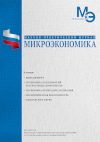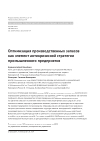Optimization of production stocks as an element of the anti-crisis strategy of an industrial enterprise
DOI: 10.33917/mic-2.115.2024.23-34
Optimization of an inventory is an important element of strategic planning of an industrial enterprise, the objectives of which are to ensure the required volume of production of finished goods, achieve minimum inventory storage costs and eliminate excessive investments of financial resources. The article describes the main approaches to inventory management, assesses their advantages and disadvantages. Using the company for the production of electrical equipment as an example, the algorithm for the quantitative allocation of the «problematic» demands in the inventory structure is proposed, this demand reduces risks from the external environment, but requires additional investments. The calculation of the parameters of the demand was performed using the resources of the ERP system and the inventory structuring model, thereby the «problem field» in the context of each inventory item has been determined for further optimization measures implementation.
References:
1. Russian Statistical Yearbook: Stat. sat. / State Com. Ros. Federation of Statistics (Goskomstat of Russia). Stat.sat./Rosstat, 2023. 701 p.
2. Babaeva E.S. Information technologies in the management of «pushing» type productions. Bulletin of the Volga State University. 2011;17:53–57. (In Russ.).
3. Bauersox D.J., Kloss D.J. Logistics integrated supply chain. Moscow: Olymp-Business CJSC, 2001. 640 p.
4. Bekmurzayeva R.H. Risks associated with interaction with suppliers and contractors / R. H. Bekmurzayeva, L. H. Dzhandarova. Business bulletin of the entrepreneur. 2021;5(3):29–31. (In Russ.).
5. Bukan J., Koenigsberg E. Scientific management of reserves. M.: Nauka, 1967. 423 p.
6. Gavrilov D.A. Production management based on MRP II [inform., resource planning, positioning strategies, cost calculation]. – 2nd ed. Peter, 2005. 416 p.
7. Zemlyanskaya V.N. The classical method of ABC analysis and its modern modification. Eurasian Union of Scientists. 2017; 9–2(42):76–81. (In Russ.).
8. Izmalkova I.V. Digitalization of accounting processes in the context of economic development in modern conditions: problems and impact on business processes / I. V. Izmalkova, G. I. Polennikova, L. Y. Tatarenko. Bulletin of the Altai Academy of Economics and Law. 2023;6–1:47–54. (In Russ.).
9. Konyukhovsky P.V. Mathematical methods of research of operations in economics. St. Petersburg: Publishing house «Peter», 2000. 208 p.
10. Mironova G.V. Concepts, strategies and models of inventory management / G.V. Mironova, A.V. Shelygov. Bulletin of the Moscow State Unitary Enterprise named after Ivan Fedorov. 2011;2:230–239. (In Russ.).
11. Nikiforova E.V. Management of material reserves in conditions of multi-nomenclature production / E. V. Nikiforova, S. A. Kalinovsky. Vector of Science of Tolyatti State University. 2011;4(18):211–216. (In Russ.).
12. Tyukhtina A.A. Models of inventory management: An educational and methodological guide. Nizhny Novgorod: Nizhny Novgorod State University, 2017. 84 p.
13. Hussein L.A. Assessment of the use of resource planning systems by Russian enterprises. Moscow Economic Journal. 2022;7(2). (In Russ.).
14. Chuvaev A.V. Improvement of the EOQ model and its expansion of capabilities for managing material reserves of enterprises in various conditions / A.V. Chuvaev, O.L. Lyamzin. Bulletin of the NGUEU. 2014;3:299–305. (In Russ.).
15. David Simchi-Levi, Xin Chen, Julien Bramel. The Logic of Logistics: Theory, Algorithms, and Applications for Logistics Management. New York, 2014.



